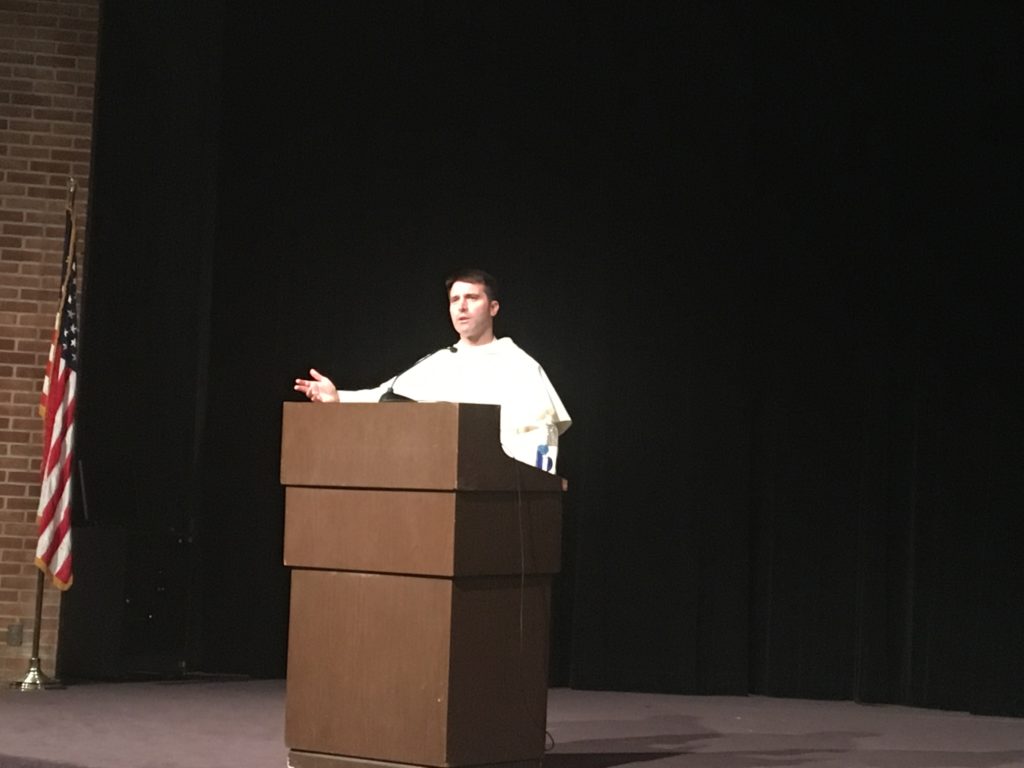
“Thou shalt not judge” has become the “first and greatest commandment” of contemporary culture, according to the Rev. Dominic Legge, who delivered a lecture in Phillips auditorium on Thursday, hosted by The Federalist Society.
“It may be the only commandment on some campuses — surely not Hillsdale College’s campus — but on many of our college campuses, where the great sin is to be judgmental, and in a way, it’s the capital vice of postmodernity,” Legge said.
While working toward his bachelor’s degree at Claremont McKenna College, Legge met Matthew Spalding, who was then a graduate student and now serves as associate vice president and dean of educational programs for Hillsdale College in Washington, D.C. Legge also eventually became friends with College President Larry Arnn. He holds a juris doctorate, a Ph.L., and a doctorate in sacred theology, and he practiced constitutional law for several years as a trial attorney in the civil division of the U.S. Department of Justice. He was ordained a priest in 2007 and currently serves as assistant director of the Thomistic Institute and as assistant professor in systematic theology at the Dominican House of Studies in Washington D.C.
During Legge’s Thursday lecture, entitled, “Judging the Truth — Law and Moral Relativism,” Legge explained when being judgmental is a sin, when it is a virtue, and how this is related to the law and to contemporary claims about truth, tolerance, and moral relativism.
He began by distinguishing between two principle acts of the mind. Simple apprehension, on the one hand, is the act of grasping the essence of a thing, such as a dog.
“This is one of the fundamental aspects of being rational, according to Aquinas,” Legge said. “It means recognizing the reality around us.”
On the other hand, what the tradition of Thomas Aquinas would call “judgment,” requires joining and separating concepts — saying a dog is angry, for example.
Legge made two distinctions about judgments: the first is that one should primarily judge a person by their actions, not their intentions, since actions are more objective.
“As private citizens at least, we should not presume to judge a person’s intentions unless we have good evidence to the contrary — that’s Aquinas’s principle,” Legge said. “And if we do presume to judge a person’s intentions without sufficient evidence, this is a rash judgment. So we should principally judge actions.”
Legge also explained that a person’s actions do not always accurately reflect his intentions. For example, someone could take something not belonging to them thinking it was his own, and that person would not deserve to be punished for stealing because they were ignorant of the wrong through no fault of their own.
Legge concluded the lecture by returning to politics and modern culture.
“Insofar as we use the language of being non-judgmental to camouflage judgments about what is really good, we are impairing our ability to reason together in common about what is good for our community,” Legge said. “And that is in fact what we find with the diversity police or politically correct conflicts we see on some contemporary campuses. By using claims like that, they are precluding an honest and open discussion about what is really good for our community, and, in the end, it’s a kind of power grab, and that’s the real danger.”
Assistant Professor of theology Jordan Wales, who attended the lecture, noted that while a lot of people espoused moral relativism in the 90s, the ideology seems less prevalent today.
“I think there’s a ray of hope, because moral relativism I think is almost passé. Now there’s a sense of moral activism rooted in a deep sense of an objective moral order,” Wales said. “Conservatives and progressives disagree about what the moral order is and what the moral goods are, and they may disagree about whether it’s possible to have a conversation between identity groups about this or that. But they do agree that there is an order and that it needs to be defended, and so that’s perhaps a more hopeful situation.”
Senior Razi Lane said he notices the “don’t judge” mentality is particularly popular among millenials.
“In Washington D.C., I think you see some of that. In millenial circles it’s really popular, especially for folks from big state schools, where I think folks try to fit in a lot more,” Lane said. “Sometimes mentioning transcendent truth can turn on disagreements, and people would rather try to avoid controversy. The ‘you do you’ slogan that you hear a lot is emblematic of that on a broader scale.”
Freshman Ryan Lanier noted the inconsistency in those who claim that one should not impose one’s morals onto others while also holding onto their own moral values.
“I have yet to meet a moral relativist who says it’s ok to murder people,” Lanier said. “You ask them, ‘Well, why is it wrong to murder people?’ and they’re like, ‘Well, it’s just wrong.’ Even there, you’re accepting the moral truth that it’s immoral to kill people, and there has to be something backing it up.”

